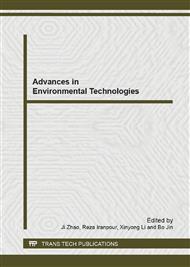p.2260
p.2264
p.2270
p.2274
p.2280
p.2284
p.2291
p.2295
p.2300
Study of Diesel Particulate Filter Filtration Efficiency and the Effects on Performance of Diesel Engine
Abstract:
The technology of diesel particulate filter (DPF) is one of the most effective ways to control particulate emission of diesel engine. In this paper, a DPF was installed on a high-pressure common rail diesel engine, which meets China Stage III emission standard (GB17691-2005), to investigate the filtration efficiency of DPF, and its effects on exhaust back pressure, fuel economy, and emissions characteristics of diesel engine by test bench. Results showed that after DPF was installed on the engine, the PM was reduced by more than 90%, while specific fuel consumption and exhaust back pressure were increased by about 5% and 10kPa, respectively.
Info:
Periodical:
Pages:
2280-2283
Citation:
Online since:
August 2013
Keywords:
Price:
Сopyright:
© 2013 Trans Tech Publications Ltd. All Rights Reserved
Share:
Citation:


